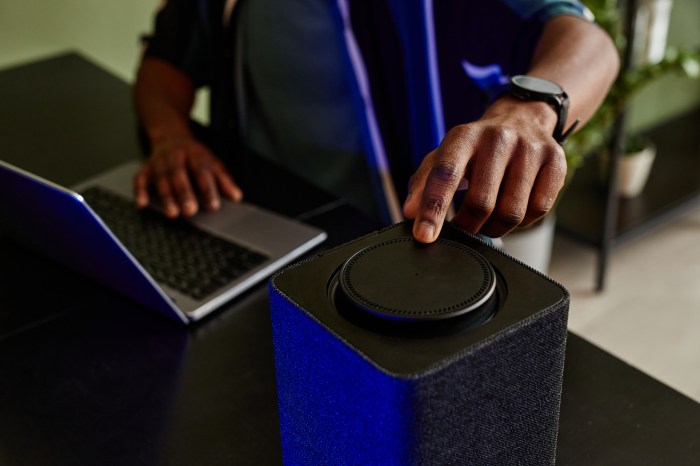
Smart speaker podcast distribution sets the stage for this enthralling narrative, offering readers a glimpse into a story that is rich in detail and brimming with originality from the outset. As smart speakers become an integral part of our daily lives, their role in podcasting is transforming how audiences access their favorite shows. This overview explores the technology behind smart speakers, their evolution, and how they serve as a bridge for podcast distribution, expanding the reach and accessibility of audio content.
In this discussion, we’ll delve into the various methods of distributing podcasts through smart speakers, the benefits they offer for both creators and listeners, as well as the challenges podcasters might face. Furthermore, we’ll touch on strategies for effective marketing and monetization tailored to this innovative technology.
Smart Speaker Overview
Smart speakers have transformed how we interact with technology at home. These devices, equipped with voice recognition software and smart home integration capabilities, allow users to perform a variety of tasks simply by using their voices. The underlying technology consists of a combination of artificial intelligence, natural language processing, and cloud computing, which work together to understand and execute user commands.The evolution of smart speakers has been remarkable.
Initially, they were simple voice-controlled devices that could perform basic functions like playing music or setting alarms. However, as the home automation ecosystem has grown, so have the capabilities of smart speakers. They now serve as central hubs for smart home devices, allowing users to control lights, thermostats, and security systems seamlessly. Key manufacturers such as Amazon, Google, and Apple have significantly contributed to this market, each bringing unique features and functionalities that cater to consumers’ diverse needs.
Functionality and Technology
Smart speakers function by leveraging a variety of technologies, which include:
- Voice Recognition: This technology allows smart speakers to understand spoken commands and queries, enabling users to interact naturally.
- Natural Language Processing (NLP): NLP helps the speaker to interpret the intent behind user requests, making interactions more intuitive.
- Cloud Computing: Many smart speakers rely on cloud services to process complex commands and store user preferences, enhancing their functionality.
Evolution in Home Automation
The journey of smart speakers within the home automation ecosystem has led to:
- Integration with Smart Devices: Smart speakers can control a wide range of smart home devices, creating an interconnected home environment.
- Enhanced User Experience: With voice commands, users can easily manage their environment without needing a smartphone or remote, streamlining daily tasks.
- Continuous Updates: Manufacturers frequently update software, adding new features and improving existing ones, thus extending the device’s lifespan and functionality.
Key Manufacturers
Several manufacturers dominate the smart speaker market, each contributing to its growth:
- Amazon: The introduction of the Echo series has set a benchmark, integrating Alexa across numerous platforms.
- Google: Google Home devices have redefined user interaction by incorporating Google Assistant, emphasizing smart search capabilities.
- Apple: With the HomePod, Apple focuses on high-quality audio and seamless integration with its ecosystem, appealing to a niche market of loyal users.
Podcast Distribution Through Smart Speakers
Distributing podcasts through smart speakers offers an innovative way to reach audiences where they consume audio content most. As smart speakers have gained popularity, podcasters are increasingly utilizing this platform to enhance accessibility and promote their shows.The methods of distributing podcasts to smart speakers typically involve integrating with platforms that support voice commands. By allowing users to access their favorite podcasts via voice commands, podcasters can tap into a growing market of listeners who prefer hands-free options.
Methods for Distribution
Podcasters can distribute their content to smart speakers through various methods:
- Direct Integration: Platforms like Spotify and Apple Podcasts allow direct access through smart speakers, enabling seamless listening experiences.
- Voice Commands: Users can invoke their preferred podcasts by simply speaking the title or the command, making it highly user-friendly.
- Third-Party Skills: Developers can create custom skills or actions for specific smart speakers, providing unique functionalities tailored to their audience.
Benefits of Smart Speaker Accessibility
Utilizing smart speakers for podcast accessibility comes with numerous advantages:
- Hands-Free Convenience: Listeners can enjoy podcasts without needing to physically interact with devices, perfect for multitasking.
- Increased Listenership: The ease of access can attract new listeners who prefer voice commands over traditional methods of finding and playing podcasts.
- Continuous Engagement: Smart speakers can retain user engagement by suggesting related content, encouraging listeners to explore more episodes.
Challenges for Podcasters

Despite the advantages, podcasters face several challenges when utilizing smart speaker technology:
- Technical Barriers: Not all podcasters may have the technical expertise to integrate their content effectively with smart speaker platforms.
- Discoverability Issues: With numerous podcasts available, standing out can be difficult; effective strategies become critical.
- Data Limitations: Gaining insights into audience analytics on smart speaker interactions can be more complex compared to traditional platforms.
Internet Marketing for Smart Speaker Podcasts
Marketing podcasts specifically for smart speaker platforms involves unique strategies tailored to audio content consumption. As the number of smart speaker users continues to grow, leveraging internet marketing techniques becomes essential for podcasters aiming to expand their reach.Promoting podcasts effectively on smart speakers requires understanding the audience and the platforms they use. This includes optimizing content for visibility and engagement.
Strategies for Promotion
To effectively promote podcasts for smart speaker platforms, consider these strategies:
- Optimize for Voice Search: Incorporate s that align with common voice search queries to improve discoverability on smart speakers.
- Cross-Promotion: Leverage social media channels to promote episodes, encouraging followers to listen via their smart speakers.
- Engagement Campaigns: Create interactive campaigns that invite listeners to participate or provide feedback, enhancing community building.
Leveraging Social Media
Social media serves as a powerful tool for enhancing podcast visibility:
- Content Sharing: Share episodic content, sneak peeks, or highlight clips on platforms like Instagram and Twitter to draw attention.
- Community Interaction: Engage with listeners through polls, questions, and discussions to foster loyalty and encourage sharing.
- Targeted Ads: Utilize paid social media advertising to reach specific demographics that align with your podcast’s theme.
Importance of
tailored for smart speaker searches plays a vital role in podcast visibility:
- Strategy: Research and integrate relevant s that potential listeners might use when searching for content.
- Metadata Optimization: Ensure that podcast titles, descriptions, and show notes are optimized for search engines.
- Backlink Building: Focus on obtaining backlinks from reputable sites to increase authority and improve search rankings.
Affiliate Revenue Opportunities
Affiliate marketing provides an excellent revenue stream for podcasters using smart speakers. By integrating affiliate programs into podcast content, creators can monetize their shows while offering value to their audience.Identifying suitable affiliate programs is crucial for maximizing earnings. The right partnerships can align with the podcast’s brand and audience interests, fostering authenticity.
Suitable Affiliate Programs
Podcasters should consider affiliate programs that complement their content:
- Audiobook Platforms: Partner with companies like Audible to promote audiobooks that resonate with your audience.
- Tech Products: Promote gadgets or services that enhance the smart speaker experience, like smart home devices or accessories.
- Subscription Services: Highlight platforms offering subscription-based services related to your podcast’s niche.
Integrating Affiliate Marketing
Integrating affiliate marketing into podcast content can be done through:
- Dedicated Segments: Create specific segments within episodes to discuss and promote affiliate products, ensuring they fit naturally into the conversation.
- Show Notes: Include affiliate links in the show notes, encouraging listeners to explore recommended products post-episode.
- Promotional Codes: Provide listeners with exclusive discount codes to incentivize purchases through your affiliate links.
Successful Examples
Various podcasters have effectively generated affiliate revenue:
- Personal Finance Shows: By promoting budgeting apps and investment platforms, these shows have created significant income streams.
- Health and Wellness Podcasts: Affiliating with fitness products or supplements that align with their audience’s interests has proven lucrative.
- Tech Review Podcasts: By providing honest reviews and recommendations for tech products, hosts have successfully capitalized on affiliate commissions.
Audio Streaming Trends
As audio streaming continues to evolve, smart speakers play a pivotal role in shaping user preferences and behaviors. Understanding these trends is essential for podcasters looking to stay relevant and engage effectively with their audience.Recent studies indicate that listeners increasingly favor audio content, with smart speakers becoming a primary source of streaming audio. This growing reliance presents both opportunities and challenges for content creators.
Current Trends in Audio Streaming
Several current trends in audio streaming are particularly relevant:
- On-Demand Listening: Users now prefer to listen to content on their own schedule, favoring podcasts over traditional radio broadcasts.
- Short-Form Content: There is a rising demand for shorter, snappier audio segments that fit easily into busy lifestyles.
- Personalization: Tailored recommendations based on listening history are becoming the norm, enhancing user engagement and satisfaction.
User Behaviors and Preferences
Understanding user behaviors is critical for podcasters:
- Multi-Tasking: Many listeners consume audio content while performing other tasks, such as cooking or driving, making convenience a priority.
- Device Preference: Smart speakers are leading devices for audio consumption, with users appreciating hands-free functionalities.
- Social Listening: Listeners are increasingly engaging with audio content in social settings, sharing recommendations with friends and family.
Importance of Audio Quality
Audio quality significantly impacts listener retention:
- Clear Sound: High-quality audio ensures that listeners can easily understand content, reducing drop-offs due to poor sound quality.
- Production Values: Investing in good production can elevate the overall experience, making the podcast feel more professional and engaging.
- Consistent Levels: Maintaining consistent audio levels across episodes helps in building a reliable listening experience for audiences.
Effective Use of Autoresponders
Autoresponders can be a powerful tool for engaging listeners of smart speaker podcasts. By designing a strategic autoresponder strategy, podcasters can enhance listener connection and promote ongoing engagement.Using autoresponders effectively requires understanding audience preferences and crafting messages that resonate with them.
Autoresponder Strategy
To create an effective autoresponder strategy, consider the following:
- Welcome Messages: Send a warm welcome message to new subscribers, introducing them to your podcast and what to expect.
- Regular Updates: Share episode releases or special content updates through timely emails to keep your audience informed.
- Feedback Requests: Encourage listeners to share their thoughts on episodes, fostering a sense of community and involvement.
Examples of Autoresponder Sequences
Implementing targeted autoresponder sequences can significantly enhance connections:
- Episode Highlights: After each episode release, send a follow-up email summarizing key points and encouraging feedback.
- Exclusive Content: Offer subscribers exclusive content or bonus episodes to reward their loyalty and encourage sharing.
- Surveys and Polls: Engage your audience with surveys to understand their preferences, tailoring future content accordingly.
Importance of Timing and Content
The timing and content of autoresponders are crucial for effectiveness:
- Timely Follow-Ups: Sending messages shortly after episode releases capitalizes on listener engagement while the content is still fresh.
- Relevant Content: Ensure that the information shared in autoresponders is pertinent to the audience’s interests, increasing the likelihood of interaction.
- Consistent Branding: Maintain your brand voice across all communications to reinforce recognition and loyalty among listeners.
Banner Advertising in Podcasting
Banner advertising presents a unique opportunity for podcasters to monetize their content while promoting relevant products or services. The integration of banner ads within podcast platforms on smart speakers can enhance visibility and drive conversions.Creating effective banner advertisements requires a blend of creativity and strategic placement to capture listeners’ attention without disrupting their experience.
Integration of Banner Advertising
Integrating banner advertising within podcast platforms can be achieved through:
- Partner Platforms: Utilize podcast hosting platforms that support banner ad placements alongside episodes, increasing visibility.
- Dynamic Ad Insertion: Implement dynamic ad insertion technology to display relevant ads based on listener profiles and preferences.
- Collaboration with Advertisers: Work closely with brands to ensure that the banner ads align well with the podcast’s theme and audience interests.
Designing Effective Banner Ads
Designing banner ads that resonate with listeners involves:
- Clear Messaging: Ensure that your message is concise and compelling, quickly conveying the value of the promoted product or service.
- Visual Appeal: Use eye-catching visuals and colors that align with your brand while standing out to capture attention.
- Call-to-Action: Include a strong call-to-action that encourages listeners to take immediate action, such as visiting a website or making a purchase.
Case Studies of Successful Campaigns
Several successful banner advertising campaigns in the podcasting space provide valuable insights:
- Health and Wellness Podcasts: Advertisers targeting health-conscious audiences have seen increased engagement through well-placed banner ads.
- Financial Podcasts: Collaboration with financial services for banner advertising has resulted in higher conversion rates due to the relevant audience alignment.
- Technology Reviews: Tech podcasts integrated banner ads effectively, leading to increased brand awareness and sales for tech products.
Blogging for Smart Speaker Podcast Promotion
Blogging can serve as a powerful complementary strategy for promoting podcasts on smart speaker platforms. By creating relevant blog content, podcasters can attract an audience interested in smart speakers while enhancing their podcast’s visibility.A well-structured blogging strategy can help podcasters connect with their audience on multiple levels, driving engagement and growing their listener base.
Blogging Strategy for Podcasting
To create an effective blogging strategy, consider the following components:
- Content Topics: Cover topics related to your podcast theme, such as guest interviews, episode summaries, or industry trends.
- Best Practices: Implement techniques to improve search visibility, targeting s that potential listeners may use.
- Cross-Promotion: Utilize blog posts to promote new podcast episodes, providing links or embedding audio players for easy access.
Topics for Audience Attraction
Identify topics that resonate with your target audience:
- How-To Guides: Create informative guides that relate to your podcast content, providing additional value to listeners.
- Industry News: Share insights on the latest developments within your podcast’s niche, establishing authority and keeping your audience informed.
- Listener Stories: Encourage listeners to share their experiences related to your podcast’s themes, fostering community engagement.
Best Practices for Linking Blog Content
Linking blog content effectively to podcast episodes is essential:
- Direct Links: Include direct links to relevant podcast episodes within blog posts, making it easy for readers to listen.
- Embedded Players: Consider embedding podcast players directly in blog posts, allowing visitors to listen without leaving the site.
- Consistent Updates: Regularly update blog content to align with new podcast episodes, keeping both platforms synchronized and engaging.
Domain Names for Podcasting
Choosing the right domain name is a critical aspect of branding for smart speaker podcasts. A well-selected domain name can enhance recognition, improve searchability, and support overall marketing efforts.The process of selecting an effective domain name involves careful consideration of various factors to ensure it aligns with the podcast’s identity.
Importance of Domain Names
Domain names play a vital role in branding for podcasters:
- First Impressions: A catchy and relevant domain name can create a positive first impression, enticing potential listeners to explore further.
- Search Engine Optimization: Including s relevant to your podcast in the domain can improve search visibility, making it easier for new listeners to discover your content.
- Brand Consistency: A domain that reflects the podcast’s name and theme reinforces brand identity across platforms.
Tips for Selecting Domain Names
When selecting an effective domain name, consider these tips:
- Keep It Short: Aim for a concise domain name that is easy to remember and type.
- Avoid Special Characters: Stick to alphanumeric characters to minimize confusion and typing errors.
- Check Availability: Ensure the desired domain is available, and consider securing variations to protect your brand.
Common Mistakes to Avoid
Avoid these common mistakes when choosing a domain name:
- Overly Complicated Names: Avoid names that are difficult to spell or pronounce, as they can deter potential listeners.
- Lack of Relevance: Ensure the domain is relevant to your podcast content; a mismatch can confuse potential audiences.
- Ignoring Brand Considerations: Failing to consider how the domain will fit into your overall branding strategy can limit future growth.
E-books and Monetization
Turning podcast content into e-books presents a valuable monetization opportunity for podcasters. By leveraging existing content and expanding on it, podcasters can create additional revenue streams while providing valuable resources to their audience.Developing an effective strategy for marketing e-books alongside smart speaker podcasts requires a thoughtful approach to content and promotion.
Strategies for Creating E-books
To effectively turn podcast content into e-books, consider these strategies:
- Compilation of Episodes: Gather related podcast episodes into a cohesive theme, providing additional insights and context.
- Expanded Content: Enhance episodes with additional research, interviews, or case studies to add value beyond the audio format.
- Interactive Elements: Incorporate interactive features, such as links to audio content or reflection questions, to engage readers.
Marketing E-books
Marketing e-books alongside smart speaker podcasts involves:
- Leveraging Podcast Platforms: Promote e-books through podcast episodes, discussing key insights and encouraging listeners to purchase.
- Social Media Campaigns: Use social media platforms to announce the release of e-books and share snippets to entice potential buyers.
- Email Newsletters: Include promotions for e-books in email communications, providing exclusive offers to subscribers.
Potential Revenue Streams
Podcasters can explore various revenue streams linked to e-book sales:
- Direct Sales: Sell e-books directly from a podcast website or associated platforms, generating income from each sale.
- Affiliate Marketing: Promote related products within e-books, earning commissions through affiliate partnerships.
- Bundled Offers: Offer e-books as part of a bundle with other products or services, enhancing perceived value and driving sales.
Closure
As we wrap up our exploration of smart speaker podcast distribution, it’s clear that this technology is not just a trend but a vital part of the podcasting ecosystem. By understanding how to effectively leverage smart speakers for podcast distribution, creators can enhance their reach, engage with listeners more effectively, and explore new revenue opportunities. Whether it’s through innovative marketing strategies or monetization approaches, embracing smart speaker technology could be the key to the next level of podcasting success.
Key Questions Answered
What are smart speakers?
Smart speakers are voice-activated devices that connect to the internet, allowing users to stream music, control smart home devices, and access information, including podcasts.
How do I distribute my podcast to smart speakers?
Podcasts can be distributed to smart speakers through various platforms that support voice commands, typically involving submission to directories like Apple Podcasts or Spotify.
What are the benefits of using smart speakers for podcasts?
Smart speakers enhance accessibility, allowing users to listen to podcasts hands-free and making it easier for them to integrate audio content into their daily routines.
Are there any challenges with smart speaker podcast distribution?
Challenges include ensuring compatibility with various smart speaker platforms and optimizing content for voice search, which may differ from traditional search engine optimization.
How can I market my podcast for smart speakers?
Utilizing social media, optimizing for specifically for voice search, and engaging directly with listeners through email campaigns can help effectively market your podcast.





